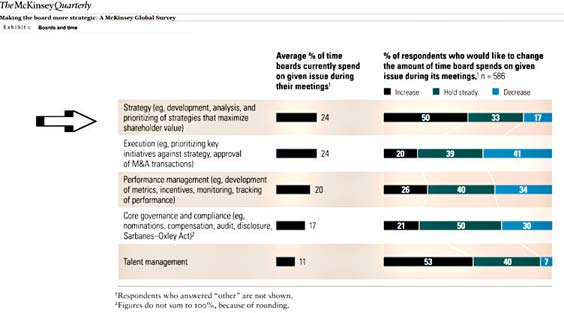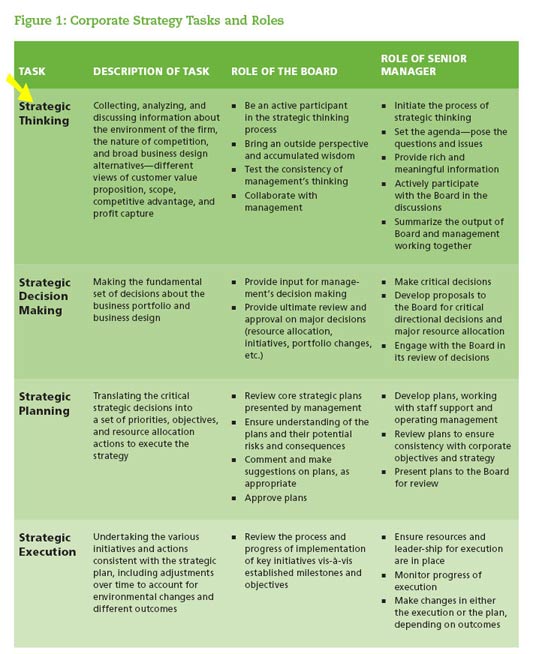Earlier this year I wrote Corporate Governance Trends 2009. I thought it appropriate to expand on some of the trends discussed. For this post I will review Corporate Strategy and the importance of the Board in not just reviewing the strategy but becoming active participants in its formulation. At its essence Corporate Strategy is rigorously defining “where we are, where are going and how we will get there”.
In the past, the CEO and the strategy team would develop the corporate strategy, send it to the Board members and meet at an offsite location. The C-Suite would present the plan and the Board would usually accept it. Well the world has changed dramatically and has become far more complex. This static strategy process does not work in this new corporate world.
A McKinsey survey indicates that Boards want to spend more time on Corporate Strategy matters–

What is causing this increased attention?
According to Frost and Sullivan—
Factors in current business environment shaping Corporate Strategy and Corporate Development plans in 2009
Respondents identified the following as the top five environmental factors:
- Global economic downturn (51%)
- Increasing need for product/service innovation (32%)
- Intensifying competition (26%)
- Emerging global markets (22%)
- Corporate restructuring (21%)
So what should be the roles the Board should play in Corporate Strategy?
An excellent report “Engaging the Board in Corporate Strategy” from Oliver Wyman – Delta Organization & Leadership provides an overview —

The key role and the one missing most in the past is Strategic Thinking.
Boards cannot leave this vital role to management. Their independent insights and viewpoints ensure that development of the strategy will not become a product of group think. Boards in companies such as UBS and United Technologies are already engaged in Corporate Strategy development.
More on this in a future post.
Lucy is Editor at Corporate Eye



I really think that this post is spot on. Especially for its value in the proper way to manage a top down corporate strategy. With blame resting upon the senior management, for many of the issues which our corporations face, it is increasingly important that the board of director be not merely head nodders leaving important strategic management decisions in the hand of senior management entirely.
On issues involving a need for strategic thinking, as mentioned in the article, bringing in an outside perspective can have drastically helpful effects. If the board members contribute their individual perspectives in a way that really give large contributions to strategic internal analysis and external analysis then the business can avoid some largely avoidable capital allocations to research projects and consulting fees.
Board members as huge stakeholders must realize they have the power to command the authority to give feedback about long term objectives unparallel to any one else. If they lack the will to provide feedback at meetings then they will lose a degree of their ability to resonate a meaningful message into the senior management. The lack of feedback seem from any senior manager from the board will only give the senior manager an ability to take strategic management tactics entirely into his or her own hands, for better or for worse.
Justin, thanks for your comment – I agree with you. Did you see an interesting McKinsey article and survey from February (here) about the potential need to shake up the board’s process and style of interaction?
An outside perspective can help, and this is at least part of the non-executives’ role, surely – to bring their expertise gained elsewhere to this company. But, as anyone who has done any committee work at any level will know, it is all too easy to let group-thinking take over. A strong chairman is needed to avoid that – but not so strong that no-one feels they can dissent! It’s a difficult balance…
Justin,
Thanks for commenting. Seems this is related to the financial crisis. BOD’s are wising up and starting to realize their role is more than to :rubber stamp” the strategic plan. You might also be interested in this
http://www.kslaw.com/library/publication/LDN_ViewPoints_2.pdf
Keep those comments coming.
Best wishes,
Ed